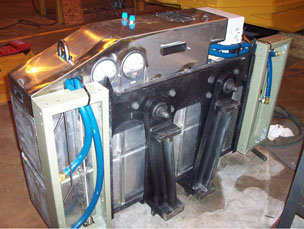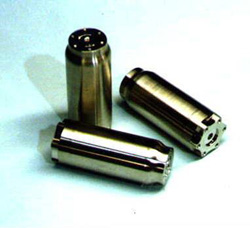Solid State Hydrogen Storage
|
Solid-State Hydrogen Storage based on reversible metal hydrides offers several benefits over other means of storing hydrogen. Reversible metal hydrides operate at low pressure, especially when compared to compressed hydrogen, and do not need to be kept at the cryogenic temperatures required for liquid hydrogen storage. Reversible hydride storage typically requires less energy on a system basis, is compact, and can be conformable to fit space available on the application. Hydrogen storage systems range in size from small to large. Ergenics has made small storage units that provide fuel for hydrogen fuel cell-powered cell phones and pure hydrogen for the Cassini spacecraft’s exploration of Saturn’s moon, Titan. Medium sized units, like the ST1-AL , are used for portable fuel cells and fuel cell powered video cameras. One of the key challenges of the Hydrogen Economy is that of hydrogen storage. Without a cost-effective, compact and practical solution to the storage of hydrogen onboard vehicles, the promise of a clean and reliable energy supply will not significantly materialize in the transportation sector and in other applications of the new Hydrogen Economy. Worldwide research is underway to solve the storage challenge onboard vehicles with solid-state hydrogen storage based on solid adsorbents, advanced hydrides and combinations thereof. The challenges include reducing weight, lowering cost and reducing refill time at the service station. Additionally, there are opportunities for hydride-based hydrogen storage in hydrogen delivery, refueling stations, and portable power. Ergenics has developed a hydrogen storage system that begins to address the engineering challenges of vehicle storage.
|
Two of Ergenics’ miniature hydrogen storage units were on-board the Cassini space probe and performed flawlessly. |
|
|
Vehicle Projects LLC, the project arm of Denver-based Fuelcell Propulsion Institute, is leading an international consortium to develop and demonstrate a mine loader employing fuel cell power and metal-hydride storage. The project cost will be close to $10 million and the mine loader will be demonstrated at three sites across North America in 2006 and 2007. Project partners include Nuvera, AeroVironment, Caterpillar and several other organizations. The U.S. DOE, and the Canadian government, are contributing 50% of the funds required, with the other 50% being provided by the partners. Ergenics’ contribution to the project centers on hydrogen storage and refuelling, with the development of a customized system comprising two storage modules capable of storing approximately 14 kilograms of hydrogen and being refilled in less than 15 minutes. The storage system employs a modular design with enhanced heat transfer with a versatile “form factor” that can be used in other applications such as material handling equipment, airport equipment and other off-road vehicles. The design also forms the basis for automotive hydrogen storage tanks. |





